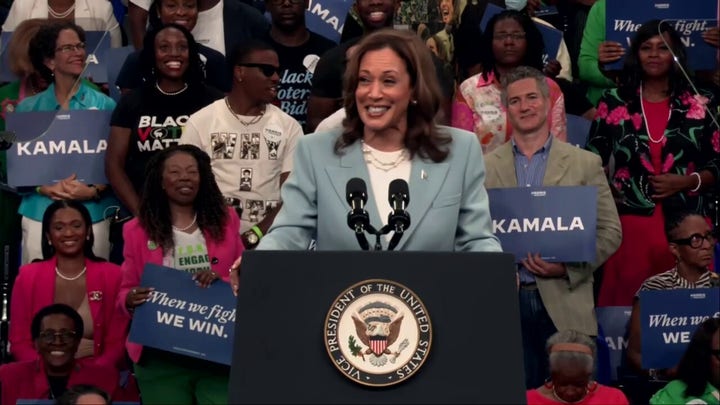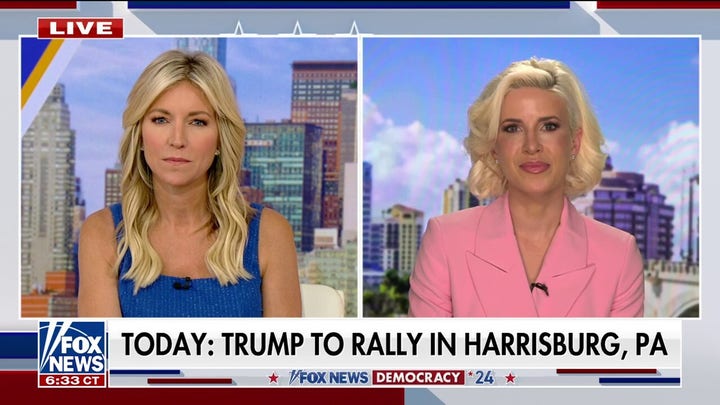A pair of Black female activists, who have met with Vice President Harris several times and previously vowed to get ‘real serious’ about helping her become the next president, could alienate some of the ‘White women for Kamala’ supporters with their past rhetoric as they mobilize ahead of November’s election.
Cora Masters Barry, an appointee of Democrat D.C. Mayor Muriel Bowser and longtime civil rights activist, and Melanie Campbell, who leads the National Coalition on Black Civic Participation, have visited the White House more than 50 times combined during the Biden administration, including nearly a dozen visits with Harris or her staff, a Fox News Digital review found.
Weeks before President Biden and Harris were sworn into office in 2021, Barry and Campbell participated in a public Zoom call in which they made controversial statements about Trump supporters and attacked White voters, specifically White women, which could cause some internal clashes as different coalitions mobilize to try to get Harris into the White House.
Approximately 164,000 White women hopped on a Zoom call last week, which was organized by Moms Demand Action founder Shannon Watts and other female celebrities. The call, titled ‘White Women: Answer the Call,’ reportedly raised millions of dollars for Harris’ campaign and could be a major fundraising force over the next few months.
However, the unearthed comments from the two activists could cause some internal tension for the Harris campaign as they look to mobilize different voting blocs and have called for ‘Unity.’
‘If you claim to stand for unity, you need to do more than just use the word,’ Harris recently said.
‘We have to change our strategy. We got to get our people. We have to get our – they got their people. They got all the trailer parks all covered,’ Barry said during the Zoom. ‘All them people up in West Virginia and the hills, they’re covered. They got them all the way there to Wall Street.’
‘[Trump] did that, and we’re sitting here talking about the White women. F— the white women– excuse me – forget the White women. They’re going to do what the White men tell them to do,’ Barry continued, eliciting laughter and clapping from Campbell.
‘What they tell themselves,’ Campbell interjected.
‘They be smiling in their faces, they want to stay in charge,’ Barry continued, with Campbell reacting affirmatively in the background. ‘I don’t care nothing about them, we got to do what we got to do.’
Barry went on to say that the Black community has to ‘get real serious about organizing to elect Kamala Harris as the next President of the United States’ and that she doesn’t ‘want no women’s parade.’
‘If they have another Women’s March – I’ll go over there and blow it up,’ Barry said.
Barry also attacked supporters of then-President Trump, comparing them to the Ku Klux Klan by saying, ‘I’m not saying everyone who voted for Trump is wearing a white sheet, but they got one in their closet, and it comes out when we start messing with the economic value or the balance of power.’
Barry went on to say at the time that, should Biden win the 2020 election, her group has ‘got to start organizing to make sure that the next president of the United States is a Black woman.’
‘And that’s not going to happen if we don’t reach all of our Black people, because they’re the ones who are going to put her in there,’ Barry added. ‘Those White folks ain’t going to put her in there.’
During the same Zoom call, Campbell was also critical of White women who have cast their votes for Trump, saying ‘race’ and ‘White privilege’ were driving factors and that she didn’t understand how they could support someone who ‘disrespects you as a woman.’
‘Am I surprised? No. Am I frustrated? Yeah – determined that we have to still find a way to get up and deal with it,’ Campbell said. ‘What I’m not interested in doing is what I did, Cora, in 2016 is have these fruitless conversations with my White girlfriends who want to tell me we need to sit down and have a conversation. No we don’t. You need to go talk to your sister. You need to go talk to your cousin.’
‘I have no interest in understanding why White folks do what they do. They do what they do because they doing what they do if I was them. They’re fighting to stay in charge and in control. That’s what they’re doing. I ain’t mad at them. What I am is mad at us,’ Barry added, referring to the Black community.
Near the end of the Zoom call, Barry said it is a ‘perfect time’ to mobilize Black voters and push their agenda ‘because there’s a lot of White guilt money out there.’
‘I’m gonna take it- put it in my community and radicalize my people so they can come for your job. I’m saying it’s time to act,’ she continued.
In addition to Barry’s comments about White women, Fox News Digital previously reported on Barry lavishly praising notorious antisemite Louis Farrakhan in 2022 at a private event honoring her late husband, former D.C. Mayor Marion Barry.
During Barry’s remarks at the private ceremony, she praised Farrakhan, who has espoused antisemitic rhetoric for decades, including calling Jews ‘wicked’ and comparing them to termites. Barry referred to Farrakhan as a ‘friend’ and ‘member of the family’ while also telling him ‘I love you more than words will ever say.’
‘Minister Farrakhan, we love you more than you love us. You just don’t know it,’ she added.
Farrakhan in turn praised Barry, saying, ‘Praise God for this woman. She is a treasure. A real treasure.’
A spokesperson for both Barry and Campbell defended the comment about White women, previously telling Fox News Digital that the comment was in reference to how White women are not as reliable Democrat voters and that the vice president was not part of the conversation.
Barry, Campbell and the Harris campaign did not respond to Fox News Digital’s requests for comment.
Fox News’ Houston Keene contributed to this report.
This post appeared first on FOX NEWS




